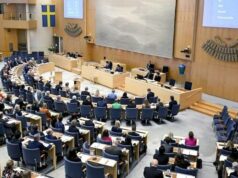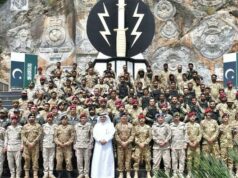India has been admitted to Agreement on the Establishment of an International Transport and Transit Corridor between Iran, Oman, Turkmenistan and Uzbekistan (Ashgabat Agreement) as Delhi pushes its Eurasian connectivity agreement ahead of the PM’s Oman trip and hosting Iranian President — all in February.
The agreement was signed on 25 April, 2011 (Ashgabat Agreement).
Turkmenistan, as depository State of Ashgabat Agreement, informed India on Thursday that all the four founding members have consented to the Accession of India and that India’s accession to the Agreement will enter into force on 3 February 2018.
Ashgabat Agreement envisages facilitation of transit and transportation of goods between Central Asia and the Persian Gulf. Accession to the Agreement would diversify India’s connectivity options with Central Asia and have a positive influence on India’s trade and commercial ties with the region.
Upon receipt of approval of the Modi Cabinet for India’s accession to the Ashgabat Agreement, India had deposited the Instrument of Accession with Turkmenistan in April 2016. This agreement will complement India’s presence in Chabahar Port, INSTC as well as future accession to Eurasian Economic Union.
Earlier, The presidents of Russia and Turkmenistan have signed a “strategic partnership” agreement in a show of cooperation between two former Soviet republics whose ties are sometimes clouded by disputes.
Russian President Vladimir Putin and his Turkmen counterpart, Gurbanguly Berdymukhammedov, signed the largely symbolic deal during a one-day visit by Putin to Ashgabat on October 2, his first official visit to the Turkmen capital in five years.
Putin lamented that the volume of trade between the two countries had “unfortunately” declined in 2016, and expressed hope that the trend would be reversed soon.
Berdymukhammedov said his country was ready for mutual cooperation with Russia in the region.
“I would like to mention that we respect and understand Russia’s interests in Central Asia. We here are always ready for the continuation of our close and systemic cooperation that is a stabilizing element for the region,” he said.
The Turkmen president added that Russia’s involvement in the development of neighboring Afghanistan was “of great importance” for regional stability.
Several other bilateral documents were signed in the two leaders’ presence, including agreements on the mutual establishment of migration-representation offices and cooperation in combating illegal drug trafficking.
Putin’s visit came days after Russia’s largest mobile provider, MTS, suspended its operations in Turkmenistan after a state telecommunications company cut its access to services.
MTS said on September 29 it was continuing talks with the authorities in order to extend the permission it needs to use frequencies and other resources to provide services in the natural-gas-rich former Soviet republic.
Neither Putin nor Berdymukhammedov mentioned the conflict during the October 2 visit in Ashgabat.
Ties between Russia and Turkmenistan have been also strained by disputes over issues including gas supplies.
Turkmenistan casts itself as a neutral country and is not a member of the Russia-led Eurasian Economic Union or the Collective Security Treaty Organization, which include other former Soviet republics in Central Asia.
Putin last met with Berdymukhammedov in November 2016 in Sochi, Russia. His last visit to Ashgabat was in December 2012.




